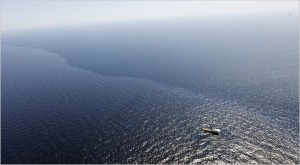In a powerful essay on the impact of Hurricane Katrina in New Orleans, the geographer Neil Smith argues that “there is no such thing as a natural disaster. In every phase and aspect of a disaster – causes, vulnerability, preparedness, results and response, and reconstruction – the contours of disaster and the difference between who lives and who dies is to a greater or lesser extent a social calculus.”
Sometimes the social construction of disasters is hard to see. Take the recent earthquake in Haiti, for instance. There’s nothing anthropogenic about the shifts in tectonic plates that produce earthquakes. But there is a clear social calculus to the historical changes that put people in harm’s way when the earth begins to move.
Haiti is 99% deforested, and has experienced massive soil erosion. Many mountains in Haiti are now bare, leaving the limestone beneath the soil bare.  The destruction of Haiti’s landscape is a product of the collapse of Haiti’s agricultural sector, which has led to the vertiginous decline of the country’s peasantry.
The destruction of Haiti’s landscape is a product of the collapse of Haiti’s agricultural sector, which has led to the vertiginous decline of the country’s peasantry.
Why did this collapse happen? In the 1980s, under Jean-Claude “Baby Doc” Duvalier, one-third of Haiti’s cultivated land was shifted to export crops. U.S.-promoted agricultural policies that forced Haitian rice farmers to compete against subsidized agribusiness in North America cost an estimated 830,000 rural jobs according to Oxfam, while exacerbating malnutrition. The decimation of Haiti’s peasantry through such neoliberal policies led to mass displacement into urban areas. Along with the promise of abundant jobs of US-supported export processing zones, the decline of Haiti’s agricultural sector fueled rural migration into flimsy shantytowns in cities such as Port-au-Prince.
 Sometimes, though, the social construction of disasters is easy to see. As I write this, the first waves of oil from the massive British Petroleum spill in the Gulf of Mexico are beginning to wash up onto the fragile marshes of the Mississippi delta in Louisiana. This promises to be a disaster of massive proportions, in an area that has already suffered grievously from man-made disasters, such as the flooding of New Orleans following Hurricane Katrina. Let’s hope that something good comes of this catastrophe, beginning with massive reparations for the people of the area from BP and other fossil fuel companies, building to a decisive challenge to the Obama administration’s plans to open coastal waters to oil drilling, and concluding with a massive, Apollo-style project to shift the U.S. to renewable energy sources .
Sometimes, though, the social construction of disasters is easy to see. As I write this, the first waves of oil from the massive British Petroleum spill in the Gulf of Mexico are beginning to wash up onto the fragile marshes of the Mississippi delta in Louisiana. This promises to be a disaster of massive proportions, in an area that has already suffered grievously from man-made disasters, such as the flooding of New Orleans following Hurricane Katrina. Let’s hope that something good comes of this catastrophe, beginning with massive reparations for the people of the area from BP and other fossil fuel companies, building to a decisive challenge to the Obama administration’s plans to open coastal waters to oil drilling, and concluding with a massive, Apollo-style project to shift the U.S. to renewable energy sources .
 It’s been one month since BP’s Deepwater Horizon sank. The levels of human incompetence and political corruption that have been revealed are breathtaking. Most prominently, the role of the federal Minerals’ Management Service as pimp for the oil industry has been stripped bare for all to see.
It’s been one month since BP’s Deepwater Horizon sank. The levels of human incompetence and political corruption that have been revealed are breathtaking. Most prominently, the role of the federal Minerals’ Management Service as pimp for the oil industry has been stripped bare for all to see.




